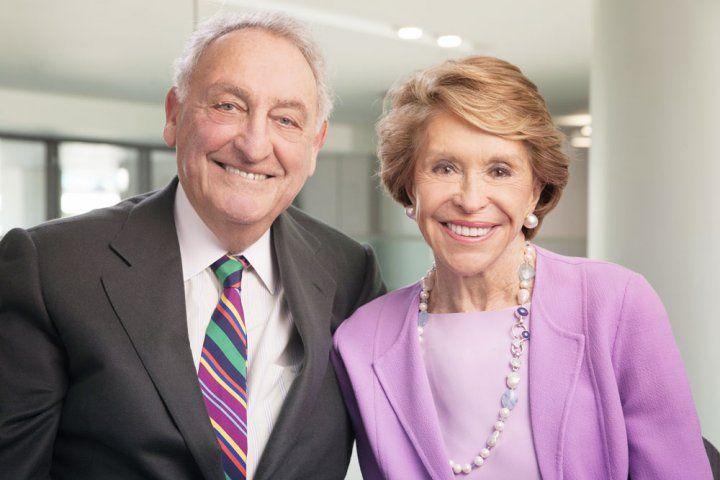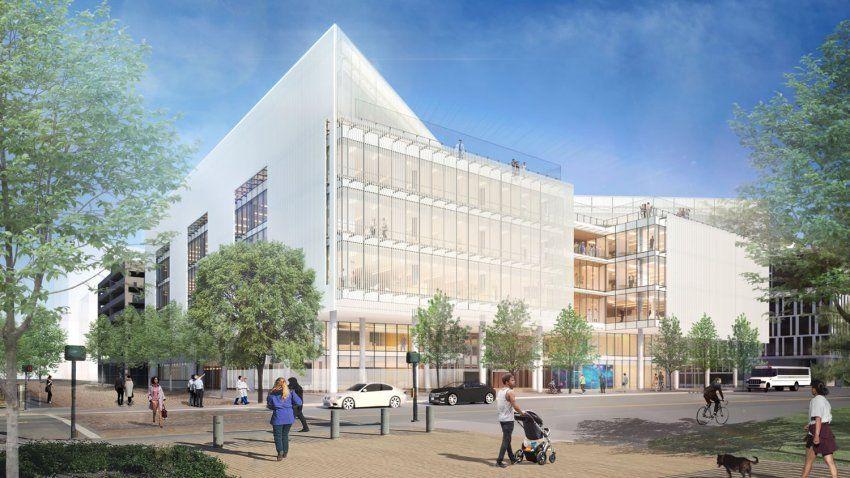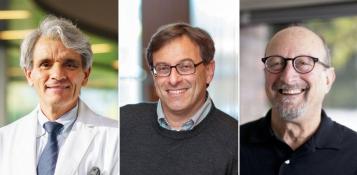By Pete Farley

Sanford I. "Sandy" and Joan Weill
With a $106 million gift from the Weill Family Foundation, UC Berkeley (Berkeley), UC San Francisco (UCSF), and the University of Washington (UW) have launched the Weill Neurohub, an innovative research network that will forge and nurture new collaborations between neuroscientists and researchers working in an array of other disciplines — including engineering, computer science, physics, chemistry, and mathematics — to speed the development of new therapies for diseases and disorders that affect the brain and nervous system.
A 2016 study by the Information Technology & Innovation Foundation estimated that, in the U.S. alone, neurological and psychiatric disorders and diseases — including Alzheimer’s, Parkinson’s, anxiety and depression, traumatic brain injury and spinal cord injury, multiple sclerosis, ALS, and schizophrenia — carry an economic cost of more than $1.5 trillion per year, nearly 9 percent of GDP.
“The gains in knowledge amassed by neuroscientists over the past few decades can now be brought to the next level with supercomputers, electronic brain–computer interfaces, nanotechnology, robotics, and powerful imaging tools,” said philanthropist Sanford I. “Sandy” Weill, chairman of the Weill Family Foundation. “The Neurohub will seize this opportunity by building bridges between people with diverse talents and training and bringing them together in a common cause: discovering new treatments to help the millions of patients with such conditions as Alzheimer’s disease and mental illness.”
Public-private partnership
As many neurological disorders, such as dementia, are associated with aging, the costs of these unmet medical needs are expected to increase significantly in the coming years. California, with the largest aging population in the U.S., with one in five residents reaching age 65 or older in the next decade, faces particularly formidable challenges, said Governor Gavin Newsom.
“Every day, millions of people in California, the nation, and the world are facing the uncertainty of neuro-related diseases, mental illness and brain injuries, and collaboration between different disciplines in science, academia, government and philanthropy is critical to meet this challenge. Together, we must accelerate the development and use cutting-edge technology, innovation and tools that will advance research and practical application that will benefit people across the world and for generations to come,” Newsom said. “California is at the forefront of this innovation, with two of our best research universities as part of the Weill Neurohub, and I want to thank the Weill Family Foundation for their continued commitment and sense of urgency to advancing this cause.”
Complementing the strengths of UCSF, Berkeley, and UW, the Weill Neurohub will draw on the expertise and resources of the 17 national Llaboratories overseen by the Department of Energy (DOE), which excel in bioengineering, imaging, and data science. In August 2019, the Weill Family Foundation and the DOE signed a memorandum of understanding creating a new public–private partnership. The partnership is exploring the use of the department’s artificial intelligence (AI) and supercomputing capabilities, in conjunction with Bay Area universities and the private sector, to advance the study of traumatic brain injury (TBI) and neurodegenerative diseases.
Secretary of Energy Rick Perry, who has spearheaded the creation of an AI and Technology Office during his tenure at DOE, said that the vision for the Weill Neurohub dovetails with his own mission to make publicly funded AI and supercomputing resources more widely accessible to advance scientific discovery. “We are on the cusp of great discoveries that could transform our approach to TBI, Alzheimer’s disease, and other neurological and psychiatric disorders, and easing access to the world-class computational power of our National Laboratories to initiatives like the Weill Neurohub is a win-win for science and the public sector – and, eventually, for patients.”
The Weill Neurohub will enable the three universities to work together on these pressing problems. For example, UW and UCSF, renowned research universities with long traditions of excellence in basic neuroscience research, also have federally sponsored Alzheimer’s Disease Research Centers (ADRC). Through the Weill Neurohub, members of UW’s ARDC, part of the UW Medicine Memory and Brain Wellness Center, and UCSF’s ADRC, led by the UCSF Memory and Aging Center, will collaborate with top neurodegeneration researchers at Berkeley.

When completed in 2020, the Joan and Sanford I. Weill Neurosciences Building on the UCSF Mission Bay campus will house the Weill Neurohub on the sixth floor.
New approaches to brain diseases
The Weill Neurohub will provide funding for faculty, postdoctoral fellows, and graduate students at UW, Berkeley, and UCSF working on cross-disciplinary projects, including funding for “high-risk/high-reward” proposals that are particularly innovative and less likely to find support through conventional funding sources. But the bulk of the Weill Neurohub’s funding will support highly novel cross-institutional projects built on one or more of four scientific “pillars” that Weill Neurohub leaders have deemed priority areas for answering the toughest questions about the brain and discovering new approaches to disease: imaging; engineering; genomics and molecular therapeutics; and computation and data analytics.
The Weill Neurohub may seek additional academic, corporate, and philanthropic partners to harness resources collaboratively, better scale research and development efforts, share information and data, and create partnerships to make breakthroughs faster and at a lower cost than the current paradigm allows.
Relevant examples of interdisciplinary or cross-institutional neuroscience projects now underway at UCSF, Berkeley, and/or UW include:
- Implants that read and decode brain signals that could allow paralyzed patients to easily control robotic limbs or exoskeletons, restoring their ability to use objects or walk; similar implants are under study to restore speech in stroke patients, to reduce chronic pain, and to treat severe, intractable depression and anxiety.
- Design and construction of “NextGen7T” MRI brain scanner technology, which will shatter current resolution limits, creating the world’s first clear images of brain structures as small as 200 to 300 microns — a quarter of the size of a grain of sand — which is about 60 times sharper than a standard hospital MRI. For brain function, NextGen7T will be able to detect activity in regions as small as 400 microns, allowing for the discovery of new brain circuits and, for the first time, detecting the direction of information flow in the brain. This breakthrough tool will provide Weill Neurohub investigators with deeper understanding of how brain structure and function change in disease, and to test the effectiveness of treatment innovations.
- Customized neurotherapies based on the CRISPR gene-targeting system to treat rare inherited movement disorders and eye diseases that can lead to blindness.
- Miniaturized, non-invasive Band-Aid–sized devices that could provide therapeutic stimulation through the skin to treat spinal cord injury.
- AI applications with the power to detect tiny but life-threatening hemorrhages in CT scans of the entire brain, which may contain over a million pixels, in minutes. With this information, neuroradiologists can quickly consult with neurologists and neurosurgeons, when time is of the essence, to zero in on the best treatment plan.
- Tablet-based applications that seamlessly draw together medical records, images, and population-derived data, giving patients with neurological diseases such as multiple sclerosis an easy-to-use portal to record, analyze, and understand their health.
Joining forces of 3 world-class universities
This gift expands on the unique vision and mission of the UCSF Weill Institute for Neurosciences, established in 2016 with a $185 million gift from the Weill Family Foundation and Joan and Sandy Weill — whose giving to the neuroscience community now exceeds $300 million — said UCSF’s Stephen Hauser, MD, the Robert A. Fishman Distinguished Professor of Neurology and Weill Institute director.
“The UCSF Weill Institute set out to break down walls between the clinical disciplines of neurology, neurosurgery, and psychiatry, and also bring these clinical specialties together with the basic neurosciences,” Hauser said. “Now, with the Weill Neurohub, we’re going even further: eliminating institutional boundaries between three great public research universities, and also other disciplinary walls between ‘traditional’ neuroscience and ‘non-traditional’ approaches to understanding the brain. By embracing engineering, data analysis, and imaging science at this dramatically higher level — areas in which both Berkeley and UW are among the best in the world — neuroscientists on all three campuses will gain crucial tools and insights that will bring us closer to our shared goal of reducing suffering from brain diseases.”
Hauser will serve as one of two co-directors of the new Weill Neurohub along with Berkeley’s Ehud “Udi” Isacoff, PhD, the Evan Rauch Chair of Neuroscience. Together with Tom Daniel, PhD, the Joan and Richard Komen Endowed Chair and professor of biology at UW, they will serve on the Weill Neurohub’s Leadership Committee. Oberndorf Family Distinguished Professor and UCSF Department of Psychiatry Chair Matthew W. State, MD, PhD, and UCSF Chancellor Sam Hawgood, MBBS, will also join them on the committee.
“In the Weill Neurohub, the emphasis will be on technology to enable discovery of disease mechanisms, and thus development of novel treatments and early detection of neurologic diseases, to allow intervention before conditions become severe,” said Isacoff, who heads Berkeley’s Helen Wills Neuroscience Institute. “The technologies include next-generation neuroimaging and therapeutic manipulations ranging from brain implants to CRISPR gene editing, with major efforts in machine learning and high-speed computation. I think these three campuses can succeed in this joint mission in a way that no others can – the combined expertise this group brings to the table, especially when you bring in the National Labs, really is unparalleled.”
UW’s Daniel added, “The Weill Neurohub brings together three outstanding public institutions, each with a deep commitment to bridge boundaries between science, engineering, computer science, and data science to address fundamental problems in neuroscience and neural disorders. To my knowledge, this is a nationally unique enterprise – drawing on diverse approaches to accomplish goals no single institution could reach alone, as well as seeding and accelerating research and discovery.”

Weill Neurohub leadership, from left to right: UCSF's Stephen Hauser, MD, Berkeley's Ehud "Udi" Isacoff, PhD, and UW's Tom Daniel, PhD.
Neuroscientists have made huge strides in understanding the brain in the 30 years since President George H. W. Bush designated the 1990s as the “Decade of the Brain,” and subsequently through the National Institute of Health’s ongoing BRAIN Initiative, first announced by President Obama in 2013. But treatments for neurological and psychiatric diseases have lagged far behind those for other common afflictions, such as cardiovascular disease and cancer.
Much of the lack of progress on neurological and psychiatric disease is due to the unparalleled complexity of the nervous system, in which hundreds of billions of nerve cells and support cells form as many as 100 trillion connections in intricate three-dimensional networks throughout the brain and spinal cord. The Weill Neurohub’s leaders believe reaching beyond conventional approaches is essential to grappling with this complexity.
“Despite amazing advances in neuroscience, new therapies are not reaching patients with mental illness and neurological disorders nearly as quickly as they have for heart disease and cancer. And in addition to the terrible personal toll these illnesses exact on patients and their families, they also have a massive impact on our health care system and on the global economy,” said Joan Weill, president of the Weill Family Foundation. “Our goal, through the broad and multifaceted approach of the Weill Neurohub, is to begin to change that.”
Further coverage
- San Francisco Chronicle: Sandy and Joan Weill donate $106M for brain research at UCSF, UC Berkeley, UW
- Bloomberg: Sandy and Joan Weill give $106 million to fund neuroscience hub
- San Francisco Business Times: Wall Street titan's foundation backs big brain research consortium with $106M
- Santa Rosa Press Democrat: Joan and Sandy Weill give $106 million for brain disease research initiative at three universities
About Joan and Sandy Weill
Joan Weill is a tireless supporter of cultural, philanthropic and civic endeavors, and commits a great deal of her life to public service and education. She worked as a volunteer in the psychiatric ward at Bellevue Hospital in New York for 2 years; served as President and board member of Citymeals-on-Wheels; and was a member of the executive committee and on the board of Women in Need. She is the past chair of Paul Smith’s College of the Adirondacks, having helped spearhead the College’s transition from a 2-year to 4-year institution. Joan served as chair of Paul Smith’s for 5 years and was on the board for 20 years. Joan is co-chair of the Advisory Committee of the Weill Music Institute at Carnegie Hall, which promotes music education in classrooms around the world, and she is a board member of the Lang International Music Foundation. In 2016, Joan retired as vice chair of the Board of Advisors of Weill Hall and the Green Music Center at Sonoma State University. Joan is chair emerita of Alvin Ailey Dance Foundation, having served on the board for 20 years and been chair for 14 years. She still serves on the Ailey board and is widely acknowledged as a driving force in the growth of the entire Ailey organization over the past two decades. Her dedication to women’s health issues led to her appointment as co-chair of the New York Presbyterian/Weill Cornell Medicine’s Women’s Health Symposium. She is also a member of the Board of Overseers of UCSF. Joan and Sandy Weill, who have been married for 64 years, are recipients of the 2009 Carnegie Medal of Philanthropy Award and 2017 Kennedy Center Award for the Human Spirit in recognition of their philanthropic efforts. Joan has received honorary degrees from Paul Smith’s; SUNY Purchase; Bank Street College; Fordham University; and Sonoma State University. She is a graduate of Brooklyn College, majoring in education with a minor in psychology.
Sandy Weill is chairman emeritus of Citigroup and CEO of Casa Rosa Ventures. In 2017, Sandy was named to the “World’s 100 Greatest Living Business Minds” by Forbes in celebration of their centennial. In 2014, he was named to CNBC’s First 25, a definitive list of 25 people around the world who have had the greatest influence in business over the past quarter century. He is a former director of the Federal Reserve Bank of New York, and has served on numerous corporate boards, including Hamilton Insurance Group (chairman), United Technologies, AT&T, E. I. Du Pont Nemours and Company, and Koc Holding, in Turkey. Sandy was the recipient of Financial World magazine’s CEO of the Year Award in 1998 and received the same honor from Chief Executive magazine in 2002. In 2015, Sandy retired as chairman of Weill Cornell Medicine after 20 years and is now chairman emeritus. He also retired as chairman of Carnegie Hall in 2015 after serving in this capacity for 24 years and assumed the role of president, joining his mentor, the late violinist Isaac Stern, as only the second person to hold the title of president since Carnegie Hall was established as a non-profit in 1960. Long a proponent of education, Sandy instituted a joint program with the New York City Board of Education in 1980 that created the Academy of Finance, which trains high school students for careers in financial services. He serves as founder and chairman of the National Academy Foundation (NAF), which oversees 109,800 students in 617 career-themed Academies of Finance, Hospitality and Tourism, Information Technology, Engineering and Health Sciences. Ninety-seven percent of NAF’s students graduate, with 90 percent having plans to pursue post-secondary education – often as the first in their families to attend college. In addition, Sandy is chairman of the Executive Council at UCSF; chairman of the Lang International Music Foundation; member of the Board of Visitors at UC Berkeley; member of the Chancellor’s Board of Advisors at UC Davis; and honorary chair of the Committee Encouraging Corporate Philanthropy. In 2016, Sandy retired as chairman of Weill Hall and the Green Music Center at Sonoma State University. Sandy has received honorary degrees from Bank Street College of Education; Howard University; Hofstra University; the University of New Haven; Sonoma State University; and the Technion Israel Institute of Technology. He is a member of the prestigious American Academy of Arts and Sciences.
About UCSF
The University of California, San Francisco is exclusively focused on the health sciences and is dedicated to promoting health worldwide through biomedical research, graduate-level education in the life sciences and health professions, and excellence in patient care. UCSF's Departments of Psychiatry, Neurology, and Neurosurgery, national leaders in research, patient care, and education, are part of the UCSF Weill Institute for Neurosciences.
About UC Berkeley
Founded in 1868, the University of California, Berkeley, is an iconic top-ranking public research university offering some 350 undergraduate and graduate degree programs ranging from the arts and humanities to the sciences and technology. It is committed to innovation, social justice and the greater good.
About the University of Washington
The University of Washington was founded in 1861 and is one of the preeminent public higher education and research institutions in the world. The UW has more than 100 members of the U.S. National Academies, elite programs in many fields, and annual standing since 1974 among the nation’s top five universities in receipt of federal research funding.





